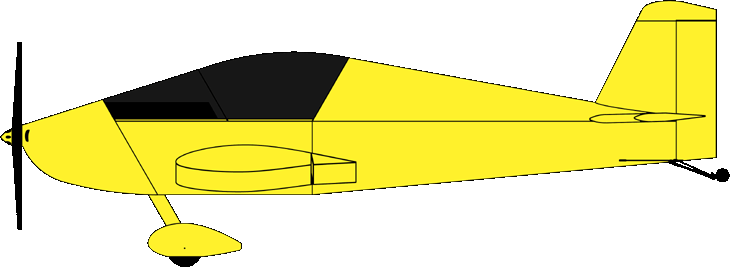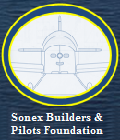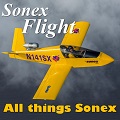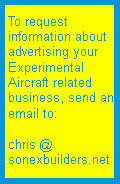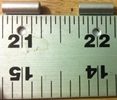

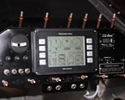
random user submitted photo
New FAA Changes to E-AB Transition Training Possible
Re: Safety and training
Ihab,
Some of your conjecture and conclusions are way off. For example in the video you reference where you say the Sonex is twitchy in a stall is of the pilot purposely doing spin testing.
As far as stall warning devices, an Angle of Attack indicator is the most effective as the Navy has proven on carrier landings.
The training that we ALL need to have is that in a loss of power event you do not go any where near a stall.
I must also disagree with you where it comes to training. I believe based on that most fatal crashes are with newly purchased second hand aircraft is that training is the answer.
Before you make any other wild conjecture at least get some training in a Sonex.
Where you are correct is we need to find any common cause for the accidents. We also need to find the cause of the engine failures and not accept the "loss of power for unknown reasons". Investigators, whether NTSB or others need to at least give us their reasonable suspicion ns so likely causes can be addressed.
Some of your conjecture and conclusions are way off. For example in the video you reference where you say the Sonex is twitchy in a stall is of the pilot purposely doing spin testing.
As far as stall warning devices, an Angle of Attack indicator is the most effective as the Navy has proven on carrier landings.
The training that we ALL need to have is that in a loss of power event you do not go any where near a stall.
I must also disagree with you where it comes to training. I believe based on that most fatal crashes are with newly purchased second hand aircraft is that training is the answer.
Before you make any other wild conjecture at least get some training in a Sonex.
Where you are correct is we need to find any common cause for the accidents. We also need to find the cause of the engine failures and not accept the "loss of power for unknown reasons". Investigators, whether NTSB or others need to at least give us their reasonable suspicion ns so likely causes can be addressed.
Sonex Tri Gear, Rotax 912 ULS, Sensenich 3 Blade Ground Adjustable Propeller
MGL Velocity EMS, Garmin GTR 200 Comm, GTX 335 ADS B Out Transponder
ILevil AW AHRS & ADS-B In, UAvionix AV20S
200+ hours previously with Aerovee engine
Sarasota, Florida
MGL Velocity EMS, Garmin GTR 200 Comm, GTX 335 ADS B Out Transponder
ILevil AW AHRS & ADS-B In, UAvionix AV20S
200+ hours previously with Aerovee engine
Sarasota, Florida
-

SonexN76ET - Posts: 492
- Joined: Tue Aug 27, 2013 2:39 pm
- Location: Atlanta
Re: Safety and training
Ihab properly concludes that power failures often lead to stalls/loss of control, but then goes on to conclude that the Sonex has control problems...with not much supporting evidence.
Based on only 400 hours in a Sonex, I would say that having a sub-50 mph stall speed makes the Sonex my first choice of planes to have a power failure in. Further, if you maintain 75 mph I'm not sure that it's possible to stall a Sonex under any circumstance. Yes, a Sonex will drop a wing in an uncoordinated stall...just like most other planes in existence. If there is an "issue" with the Sonex, it's that it has sensitive controls and if you aren't paying attention you can get into uncoordinated flight.
When an engine fails how many pilots focus completely on getting the engine running again and forget to fly the airplane?
Based on only 400 hours in a Sonex, I would say that having a sub-50 mph stall speed makes the Sonex my first choice of planes to have a power failure in. Further, if you maintain 75 mph I'm not sure that it's possible to stall a Sonex under any circumstance. Yes, a Sonex will drop a wing in an uncoordinated stall...just like most other planes in existence. If there is an "issue" with the Sonex, it's that it has sensitive controls and if you aren't paying attention you can get into uncoordinated flight.
When an engine fails how many pilots focus completely on getting the engine running again and forget to fly the airplane?
- radfordc
- Posts: 573
- Joined: Fri Jun 03, 2011 9:39 am
Re: Safety and training
Thank you folks. I am happy to be wrong. Really.
I did not know the experience level of the pilots in the fatal crashes. If someone knows, maybe this is something that ought to be written down.
I spent last night pacing up and down thinking about this and feeling bad for the people who died. Given that I constantly think about buying a Sonex, it could have been me. Given the givens, I am now worried whether a Sonex would be a good aircraft for a low-time pilot like me.
Ihab
I did not know the experience level of the pilots in the fatal crashes. If someone knows, maybe this is something that ought to be written down.
I spent last night pacing up and down thinking about this and feeling bad for the people who died. Given that I constantly think about buying a Sonex, it could have been me. Given the givens, I am now worried whether a Sonex would be a good aircraft for a low-time pilot like me.
Ihab
Ihab Awad, San Jose, CA
- ihab
- Posts: 159
- Joined: Sat Mar 09, 2013 1:45 pm
- Location: San Jose, CA (KRHV)
Re: Safety and training
SonexN76ET wrote:The aircraft stalls straight ahead, like a 152 unless you are in uncoordinated flight. Then, like a 152 it will drop a wing.
Sounds like I am just objectively wrong then. I have experienced wing drops on a C152 -- especially the one in a local club which was badly rigged for some reason.
SonexN76ET wrote:I think new pilots think they can fly the plane at 40 mph and try to do so after a power failure. You can not. The plane is light and will decelerate rapidly unless you push the nose down immediately and aggressively. You have to maintain 75 mph until you are on short final and landing is assured and then you can slow down to 60 and then enter your flare for landing. I think knowing this and practicing emergency landings is what will save lives.
Sounds reasonable. It's certainly what I am being trained for on my C162 at the moment. I remain very surprised that experienced pilots failed to do that. I'm sure there's something I'm missing, as I myself have very little experience.
SonexN76ET wrote:I will post some stall videos to show you how benign the stalls are.
Please! Thank you very much!
Ihab
Ihab Awad, San Jose, CA
- ihab
- Posts: 159
- Joined: Sat Mar 09, 2013 1:45 pm
- Location: San Jose, CA (KRHV)
Re: Safety and training
ihab wrote:I spent last night pacing up and down thinking about this and feeling bad for the people who died. Given that I constantly think about buying a Sonex, it could have been me. Given the givens, I am now worried whether a Sonex would be a good aircraft for a low-time pilot like me.
Ihab
We should also be concerned about driving a car....some drivers have fatal accidents. It helps if they are properly trained and exercise good judgement, and then they are usually quite safe.
The answer to the question "is a Sonex right" will only be known after you fly one. The transition course with Joe Norris can provide that opportunity if you can't find a local Sonex owner willing to share a ride.
- radfordc
- Posts: 573
- Joined: Fri Jun 03, 2011 9:39 am
Re: Safety and training
I think the Sonex is a fine aircraft for a low time pilot. But like any aircraft, you must fly within the envelope and your skill set.
I just returned from a 6 hour cross country to find my home airport having a quartering wind blowing 20 knots gusting to 30. I've never landed any aircraft in such wind. I had 1 hour fuel remaining and was prepared to make several attempts before diverting. When pulling up on final, at 200 AGL I was crabbing 45 degrees into the wind to keep centerline. But at 20 AGL, it squared a little better and I got her down, bunny hopping down the runway a bit because I was coming in fast. The plane was absolutely controllable, even during the bounces. I learned a lot about me and my plane yesterday. I was flying at or beyond the edge of my experience and skill set. Definitely outside my comfort zone.
As for my video on spins, I was deliberately flying her well below stall speeds and forced the spin with hard over rudder to drop the wing. Airspeed was indicating around 30MPH and my LRI was pegged to the bottom of the red. During the stall sequence, she wanted to drop the wing, but a little balancing act on the rudder pedals would keep her stalling straight forward. She only spun when I forced it by intentionally doing the wrong thing. Any plane being flown that slow with hard rudder or aileron input would probably do the same thing.
I just returned from a 6 hour cross country to find my home airport having a quartering wind blowing 20 knots gusting to 30. I've never landed any aircraft in such wind. I had 1 hour fuel remaining and was prepared to make several attempts before diverting. When pulling up on final, at 200 AGL I was crabbing 45 degrees into the wind to keep centerline. But at 20 AGL, it squared a little better and I got her down, bunny hopping down the runway a bit because I was coming in fast. The plane was absolutely controllable, even during the bounces. I learned a lot about me and my plane yesterday. I was flying at or beyond the edge of my experience and skill set. Definitely outside my comfort zone.
As for my video on spins, I was deliberately flying her well below stall speeds and forced the spin with hard over rudder to drop the wing. Airspeed was indicating around 30MPH and my LRI was pegged to the bottom of the red. During the stall sequence, she wanted to drop the wing, but a little balancing act on the rudder pedals would keep her stalling straight forward. She only spun when I forced it by intentionally doing the wrong thing. Any plane being flown that slow with hard rudder or aileron input would probably do the same thing.
John Gillis
SEL Private, Comm Glider, Tow pilot (Pawnee Driver)
Waiex N116YX, Jabiru 3300, Tail dragger,
First flight, 3/16/2013. 403 hours and climbing.
Home: CO15. KOSH x 5
Flying a B-Model Conversion (Super Bee Baby!)
-

fastj22 - Posts: 1594
- Joined: Sun Aug 21, 2011 5:56 pm
- Location: Mile High
Re: Safety and training
ihab wrote:Given the givens, I am now worried whether a Sonex would be a good aircraft for a low-time pilot like me.
There are plenty of very happy Sonex pilots out there that don't have a lot of hours. To be honest, total hours isn't really that good of an indication on how well a pilot can fly an airplane. I used to fly with some very high time corporate and airline pilots who couldn't get a Cessna 172 back on the ground. Not because they couldn't, but it was because they weren't prepared for it. There's a frequent poster on here who purchased an already flying Jab 3300 Waiex and he had less than 100 hours TT. It took a few hours to get him used to the airplane, but now he loves the speed and handling. In fact, as I write this, I think he's up giving another builder a ride just to have some fun!
Take it from me, the Sonex is a blast to fly and everyone loves it! It's not a challenging airplane to fly, but like Charlie and everyone else on here has said, you have to be prepared before you jump in it and blast off. People who are used to Cessnas and Pipers have to adjust themselves to fly an airplane that is much more responsive, has lower inertia, and has a different view out of the windshield. The Sonex is a fingertip airplane and very easy to overcontrol until you're used to it. The good news is that, once you're used to it, you love it!
Don't be scared of the airplane; be scared of not being prepared to fly it. Get some time in a Sonex, either at the factory or somewhere nearby. I have a very strong feeling that, once you get a demo flight, all of your fears will be gone and you'll love the thought of owning your own!
Mike Farley
Waiex #0056 - N569KM
Jabiru 3300A #1706
MGL Panel
Waiex #0056 - N569KM
Jabiru 3300A #1706
MGL Panel
- MichaelFarley56
- Posts: 1484
- Joined: Thu Jun 02, 2011 11:38 pm
- Location: Columbus, Ohio
Re: Safety and training
Thanks everyone. Point taken. I hope that I have not derailed this thread -- the way I look at it, I am asking questions that someone else may very well ask but not take the trouble to post here, and I hope the answers serve as clarification for future Sonex purchasers who may surf to this site.
Ihab
Ihab
Ihab Awad, San Jose, CA
- ihab
- Posts: 159
- Joined: Sat Mar 09, 2013 1:45 pm
- Location: San Jose, CA (KRHV)
Re: Safety and training/a note from William Wynne
Forwarded by request -
I saw your note on the Sonex Foundation Forum. I read it sometimes, the discussion and quality of content are much higher than most homebuilt discussion groups. In reading today I saw a post from someone named "ihab" who said he was part of ZBAG. Being a Zenith builder and flyer for more than 10 years I wanted to alert Sonex people to the history of ZBAG.
They emerged during the investigations of Zenith 601XL accidents. They took donations to fund their own investigation. The origins may have been from concerned builders, but the secret membership list allowed ZBAG to quickly also become a vehicle for disgruntled builders, Zenith competitors and ambulance chasers to attack Zenith. When the first engineer they hired came back and said there was nothing seriously wrong with the design, They let him go and found another. They had a conclusion they wanted, and were only looking for 'evidence' that supported it. ZBAG supported a tremendous amount of speculation that proved to be worthless. They didn't hurt Zenith, but they did successful scare off countless homebuilders from finishing and flying their plane. In my book, alerting builders with facts is the right thing to do, scaring anyone with speculation has no place in aviation.
I can not speak to Mr. "ihab"'s motivation, but doing something like collecting type accident statistics while not having any personal experience in the design, (evaluating stalls by one video) and offering to fund investigations into 'improvements' does not bode well. His comment "It should not be necessary for more people to die" Is the exact type of comment that lawyers fishing for an angle make. I am always alert for the motivation of anyone who falsely suggests mechanical failure or design are bigger culprits than judgment errors of pilots. You can't get rich suing dead pilots, but you can get money by going after companies and designers. Take a minute to read this:http://flycorvair.net/2013/01/28/expert-witnesses-in-civil-aviation-trials/
Lest anyone think I am against frank discussion, I have an entire section of our webpage for Risk Management http://flycorvair.net/2014/01/21/risk-m ... ence-page/ . The stories are about real people I knew, and what we can learn from loosing them. The commentary isn't generalized speculation, I earned a bachelor's degree in accident investigation from Embry-Riddle 20 years ago.
If Zenith had been the hazard to builders that Mr."Ihab" suggests, they would have been sued out of existence in the last decade. Yet they are still here and going strong. After all the speculation was done, the issue came down to this 85% of their pilot pool could not identify the Va speed of the plane as 105mph, even though it was printed on the front page of the plans, and typical second owner/ gross judgment error issues. In the end they installed a very stout mod that essentially drove the Va higher than potential cruise. Look at this story for comments on the human factor issue: http://flycorvair.com/601paper.html
William Wynne
I saw your note on the Sonex Foundation Forum. I read it sometimes, the discussion and quality of content are much higher than most homebuilt discussion groups. In reading today I saw a post from someone named "ihab" who said he was part of ZBAG. Being a Zenith builder and flyer for more than 10 years I wanted to alert Sonex people to the history of ZBAG.
They emerged during the investigations of Zenith 601XL accidents. They took donations to fund their own investigation. The origins may have been from concerned builders, but the secret membership list allowed ZBAG to quickly also become a vehicle for disgruntled builders, Zenith competitors and ambulance chasers to attack Zenith. When the first engineer they hired came back and said there was nothing seriously wrong with the design, They let him go and found another. They had a conclusion they wanted, and were only looking for 'evidence' that supported it. ZBAG supported a tremendous amount of speculation that proved to be worthless. They didn't hurt Zenith, but they did successful scare off countless homebuilders from finishing and flying their plane. In my book, alerting builders with facts is the right thing to do, scaring anyone with speculation has no place in aviation.
I can not speak to Mr. "ihab"'s motivation, but doing something like collecting type accident statistics while not having any personal experience in the design, (evaluating stalls by one video) and offering to fund investigations into 'improvements' does not bode well. His comment "It should not be necessary for more people to die" Is the exact type of comment that lawyers fishing for an angle make. I am always alert for the motivation of anyone who falsely suggests mechanical failure or design are bigger culprits than judgment errors of pilots. You can't get rich suing dead pilots, but you can get money by going after companies and designers. Take a minute to read this:http://flycorvair.net/2013/01/28/expert-witnesses-in-civil-aviation-trials/
Lest anyone think I am against frank discussion, I have an entire section of our webpage for Risk Management http://flycorvair.net/2014/01/21/risk-m ... ence-page/ . The stories are about real people I knew, and what we can learn from loosing them. The commentary isn't generalized speculation, I earned a bachelor's degree in accident investigation from Embry-Riddle 20 years ago.
If Zenith had been the hazard to builders that Mr."Ihab" suggests, they would have been sued out of existence in the last decade. Yet they are still here and going strong. After all the speculation was done, the issue came down to this 85% of their pilot pool could not identify the Va speed of the plane as 105mph, even though it was printed on the front page of the plans, and typical second owner/ gross judgment error issues. In the end they installed a very stout mod that essentially drove the Va higher than potential cruise. Look at this story for comments on the human factor issue: http://flycorvair.com/601paper.html
William Wynne
-

daleandee - Posts: 871
- Joined: Fri Feb 01, 2013 6:14 pm
Re: Safety and training
Oh dear. :(
Happy to chat 1:1 with anyone interested in the history of this. ZBAG did indeed create a very polarized atmosphere. I am very, very sorry if my remarks caused this atmosphere to carry over to this site. Please, please, let's not let that happen here.
I will say again that I do not believe, nor do I claim, the Sonex aircraft has any fundamental problems of design. As I noted privately to some others, when discussing the Zenith design, the easiest way to show how it is "done right" was to point to the Sonex. It is that experience, more than anything, which has caused me to be such a fan of the Sonex design.
Furthermore, I will add that there were a number of very unfortunate fatal accidents with the Zenith 601XL, and there are no longer any such accidents with the upgraded Zenith 601XL-B. I do not have any counter-recommendations regarding the latter.
With humility and cordial respect for everyone including William Wynne,
Ihab
Happy to chat 1:1 with anyone interested in the history of this. ZBAG did indeed create a very polarized atmosphere. I am very, very sorry if my remarks caused this atmosphere to carry over to this site. Please, please, let's not let that happen here.
I will say again that I do not believe, nor do I claim, the Sonex aircraft has any fundamental problems of design. As I noted privately to some others, when discussing the Zenith design, the easiest way to show how it is "done right" was to point to the Sonex. It is that experience, more than anything, which has caused me to be such a fan of the Sonex design.
Furthermore, I will add that there were a number of very unfortunate fatal accidents with the Zenith 601XL, and there are no longer any such accidents with the upgraded Zenith 601XL-B. I do not have any counter-recommendations regarding the latter.
With humility and cordial respect for everyone including William Wynne,
Ihab
Ihab Awad, San Jose, CA
- ihab
- Posts: 159
- Joined: Sat Mar 09, 2013 1:45 pm
- Location: San Jose, CA (KRHV)
Who is online
Users browsing this forum: wlarson861 and 16 guests
